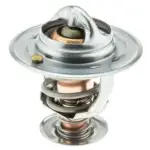We’ve all been there, do you want to pay more on synthetic oil or less for conventional? It’s hard to swallow paying that amount of money for synthetic when the cheap conventional oil sits on the shelf tempting you. Is there really any benefit to running synthetic oil? The answer is yes, synthetic is much better for your engine than conventional. In fact it may even be cheaper in the long run, extend your engines life, and reduce the risk of unplanned maintenance. Basically oil is the lifeblood of your engine.
What is Synthetic Oil made from?
Motor oil and gasoline are both made from crude oil. Crude oil is a naturally occurring, unrefined petroleum product composed of hydrocarbon deposits and other organic materials. This crude oil is then sent to a refinery where it is processed by chemical solvents. Then additives are added and motor oil is created. Regular motor oil is made of the base refined crude oil with several additives. Commonly used additives are: dispersants, detergents, friction modifiers, corrosion inhibitors, and anti-wear additives. Dispersants help the engine spray the motor oil on the mechanically moving parts. Detergents work to clean the engine. Friction modifiers work to reduce wear on contacting parts. Corrosion inhibitors prevent rust on the inside of the engine. Lastly anti-wear additives reduce the normal wear and tear that is caused by contacting parts.
Motor Oil Properties
One of the most important properties of motor oil is its viscosity. Viscosity is often thought of as a fluids resistance to flow. A more precise and engineering definition is that viscosity is ratio of shearing stress to the velocity gradient in a fluid. Viscosity has an inverse relationship with temperature. The hotter a fluid gets, the less viscous it is, and vice versa the colder the fluid the more viscous it becomes.
The viscosity of motor oil must be low enough so that the oil pump can move the oil throughout the engine, but it must also be viscous enough so that a film of oil is in between contacting parts. Here’s where things get tricky. Motor oil needs a low viscosity at cold temperatures so that it can flow but not too low at high temperatures. If a motor oil’s viscosity gets too low, it can seep around seals and leak out either externally onto the engine, or internally into the combustion chamber or into the coolant.
Synthetic oil has viscosity modifiers. These viscosity modifiers expand at higher temperatures prohibiting the oil from thinning too much. This keeps the oil within operating viscosity at high temperatures. Oil is generally advertised as 5W-20 or so on. This means that 5W-20 behaves like a 5 weight oil in lower temperatures and a 20 weight oil in higher temperatures. An easy example is 10W-20 oil has a higher viscosity at cold temperatures but the same viscosity at high temperatures when compared to 5w-20.
Benefits of running Synthetic Oil
Synthetic oil has many benefits and advantages over conventional oil. For instance, it is not uncommon for synthetic oil to be rated at 10,000 miles oil change intervals. Conventional doesn’t last much more than 5,000 miles. We recommend that you follow your owners manual for oil change interval regardless of what oil you run. Other advantages include increased protection from wear, leakage, and friction over a broader temperature range than conventional. Synthetic has been shown to be easier on engines for cold starts and reduce the amount of soot on the oil radiator compared to conventional. Mobil 1 states that just one oil change with synthetic oil can remove virtually all of the sludge in your engine. Conventional oil has a much shorter useful life. The additives in conventional can wear out leaving your engine unprotected from wear, friction, corrosion, and more.
If you have been running conventional oil and wondering if your engine can take synthetic, the answer is yes! Synthetic can be used on almost all engines. If your vehicle has high mileage, look for a synthetic oil specifically designed for high mileage engines. This will help ease the engine into the switch while it is reducing sludge deposits.
There are many benefits to running synthetic. I’ve been running synthetic in all of my personal vehicles and they have been running great. They also have 190,000+ miles on them! Synthetic’s engine protection is far superior to conventional. It has been proven in plenty of third party studies. The Motor Society verdict is that synthetic motor oil is worth the hype!
Please let us know if you have any comments or questions, and tell us what oil you use and why.



